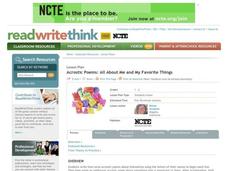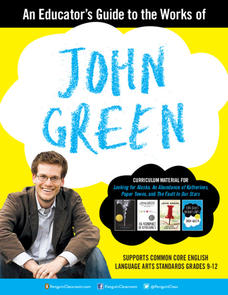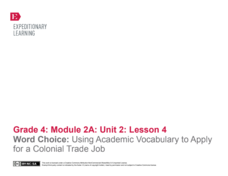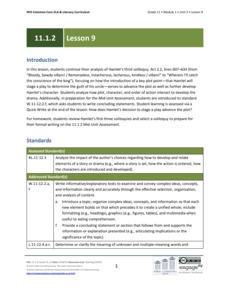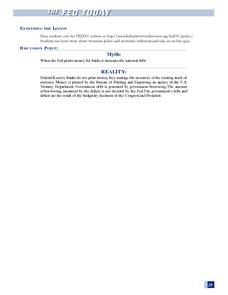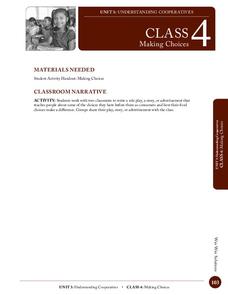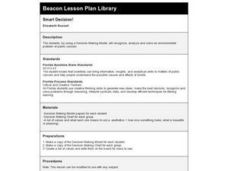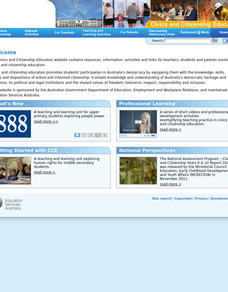National Math + Science Initative
Vocabulary Study: A Christmas Carol by Charles Dickens
Like Scrooge, your language arts learners will not shut out the lessons you teach in a vocabulary activity based on Charles Dickens' A Christmas Carol. Included in the packet is a variety of vocabulary activities and two...
Federal Reserve Bank
Insurance Inventory
Do you have enough insurance? Pupils may be surprised to learn how much their possessions are worth. This activity asks them to create an inclusive list and make a comparison to their insurance coverage. According to the statistics, most...
CK-12 Foundation
Finding and Defining Parts of a Polynomial Function Graph
So many things to remember when graphing polynomials and this guide gives a helping hand to do so. The packet goes through examples and explains things like critical values, end behavior, and multiplicities. There are image links and...
Prestwick House
Teaching Shakespeare: Sonnet 73
It's that time of year to consider how Shakespeare selects his images and structures his Sonnet 73 to develop the meaning of the poem. Class members examine the rhyme scheme, the indented lines, the conceit, and the images used in each...
National Council of Teachers of English
Acrostic Poems: All About Me and My Favorite Things
Budding poets create two acrostic poems, one for their name and another using a word of their choice. Over the course of five days, scholars compose, revise, publish, and share their work with their peers.
National Nanotechnology Infrastructure Network
Coffee Break with Nanoscience: Film Formation and “Coffee Rings”
Prepare scholars for micro and nanoscale investigations. A lab activity allows individuals to practice their experimental techniques while becoming to accustomed to the smaller scale of the materials. They also make decisions about the...
Penguin Books
An Educator’s Guide to the Works of John Green
The novels of John Green cover the gamut of teenager emotions. A guide to his works provides classroom lesson plans for the novels Looking for Alaska, An Abundance of Katherines, The Fault in Our Stars, and Paper Towns. Each lesson...
EngageNY
Word Choice: Using Academic Vocabulary to Apply for a Colonial Trade Job
Scholars reflect upon colonial jobs such as a blacksmith, cooper, shoemaker, etc. Together, the class writes a job application as a practice for working independently. Learners employ their experience in writing a job application for a...
EngageNY
Grade 11 ELA Module 1: Unit 2, Lesson 9
Hamlet has an unusual take on the criminal justice system when he decides to determine his uncle's guilt by staging a play. With the resource, scholars continue analyzing Hamlet's third soliloquy from Act 2.2 of Shakespeare's Hamlet....
Teaching Tolerance
Using Photographs to Teach Social Justice | Affirming Our Commonalities and Differences
Photos can challenge stereotypes. To gain an understanding of the big picture, groups examine a series of photographs and analyze how a photographer's choices can shape a viewer's reaction to an image. For the first set of photographs,...
Nemours KidsHealth
Food Labels: Grades 9-12
Check the label! That's the big idea in a lesson about using the nutrition facts on food labels rather than advertising hype to make healthy choices about what to eat. After reading background articles and learning how to read nutrition...
National Endowment for the Humanities
The Omnipotence of the Majority
While the American system is based on the idea of almost-universal suffrage for adults, great thinkers have had concerns about this system of governance. Using classic writings from Alexis de Tocqueville and videos highlighting thinkers...
Angel Island Immigration Station Foundation
Leaving Home Forever: What Would You Put In Your Suitcase?
Scholars put themselves in an immigrant's shoes to decide what items they would take on their journey to a new home. Learners read primary sources, take part in a whole-class discussion, and make a list that they share with their peers,...
PBS
Discuss 22-year-old Amanda Gorman’s inaugural poem “The Hill We Climb”
Two poems by National Youth Poet Laureate Amanda Gorman are spotlighted in a PBS lesson. Young scholars conduct a close reading and watch videos of Gorman reading her inaugural poem "The Hill We Climb" and "The Miracle of Morning." They...
Anti-Defamation League
Sneakers and Prejudice: Letters to Challenge Bias
After learning that NBA player Stephen Curry's shoes only come in boys' sizes, Riley wrote a letter sharing her concern, highlighting the gender bias and inviting Curry to take action. Scholars view a news clip, review the letters,...
Federal Reserve Bank
The Fed's Role in Making and Setting Monetary Policy: Part 2
How does the Federal Open Market Committee work to formulate the nation's monetary policy in the United States? As the second segment of a lesson on the role of the Fed in setting monetary policy, class members will learn about open...
Anti-Defamation League
What is the Soul Cap and Why Was it Rejected for Olympic Use?
In 2021 the FINA, the International Swimming Federation, banned using Soul Caps in the Tokyo Olympics. Middle schoolers investigate why the committee made this decision and the resulting backlash, including charges of discrimination and...
Curated OER
Making Choices
Young scholars work with a partner to write a play, story or ad that teaches about our choices as consumers. Students focus on educating people about how food choices make a difference in their lives.
Curated OER
Smart Decision!
Fourth graders use a Decision Making Model to analyze and solve an environmental problem of public concern. Groups review a real life environmental problem, and use a worksheet imbedded in this plan to guide their decision.
Curated OER
Using Maps To Make Public Health Decisions Case Study: Wildfires in Mexico 2000
Young scholars study environmental health. Using actual NOAA satellite imagery, students investigate the basic concepts of mapping. They explore the relationship between monitoring satellite images and public health decision making.
Curated OER
Individual and Environmental Factors Affecting Food Systems and Choices
Students study the environmental factors that affect food systems and choices. In this food systems and health activity, students study global and national information about obesity. Students study photos and captions about the topic....
Curated OER
Responsibilities and rights: Making civic decisions
Students, working in small groups, investigate concepts related to social and economic decision-making. They define issues for some different groups within Australia, then assign either government or individual responsibility for each...
Curated OER
Choice, Opportunity, Cost and Decisions
Students discuss the definition of scarcity and tradeoffs, and the differences between choice and cost. They create budgets and must provide tradeoffs for some of their choices.
Curated OER
Making Decisions
Students experience how to make decisions other than by default, by whim or chance, on the basis of emotions, or because of influence from others. They can make sound, healthy decisions by using a modification of the scientific method.
Other popular searches
- Decision Making Lesson Plans
- Decision Making Scenarios
- Decision Making Activities
- Ethical Decision Making Skills
- Decision Making Skills
- Decision Making Process
- Decision Making Model
- Decision Making Process
- Decision Making Techniques
- Ethical Decision Making
- Teamwork and Decision Making
- Economic Decision Making






